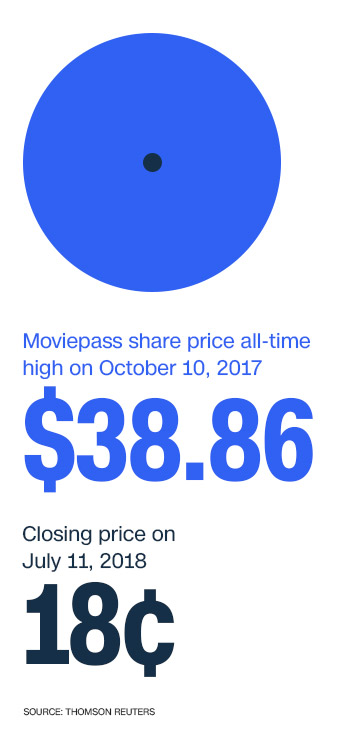
MoviePass' boss has a few words for his doubters: Don't worry. Everything is fine.
Helios and Matheson, the parent company behind the popular movie subscription service, has seen better days. Its stock has fallen 99% to as low as 17 cents per share from nearly $39 last October. That was just after MoviePass announced it was cutting its price to $10 per month.
MoviePass recently announced that it has 3 million subscribers. But the cost has also caused analysts to wonder just how sustainable the company can be.
This week, Helios and Matheson (HMNY) CEO Ted Farnsworth spoke by phone with CNNMoney about the state of the business, and his plan to make the service profitable. This interview was conducted Tuesday afternoon, and it has been edited for length and clarity.
CNNMoney: How do you bring the market's confidence back to this company? It seems pretty clear that it's vanished over the last several months.
Farnsworth: I think that one thing Wall Street likes is there's liquidity in the stock.
We've already announced that we are looking at different options of doing a reverse [stock split] and all these different things to recapitalize, restructure the company.
But there's no shortage of institutions willing to work with us to give us money, even as we're going through this right now, losing money. The institutions definitely understand the model. They understand where we're going. And I think that we've gotten there in record time.
I think Wall Street, the same as venture capitalists, they're used to seeing a model like this, similar to a Netflix (NFLX), where the company burns a significant amount of cash to get to profitability, but also to claim market share.
The timeline [for profitability] really is by the end of this year, when you hit around 5 million subscribers, is what our model shows.
You've mentioned that there are several institutions that are still willing to work with you and believe in this company. Who are those institutions?
They are all in our filings. But I can't say who we are talking to now, just because it's all not public information. But in all our filings in the past, you can see different ones that are out there. And we're talking to several of them, not all of them yet.
Related: MoviePass is running out of money and needs to raise $1.2 billion
How do you figure that someone who goes to movies nine or 10 times a year on MoviePass will offset the cost of $10 per month? There are markets where the cost of a movie ticket is more than $10. And AMC, on its last earnings call, mentioned that you pay $12 a ticket.
AMC has no idea what we pay them, which was really interesting that they put that out there. Because, you know, that's not a true number, either.
What do you pay them?
You know what, we don't disclose it, but it's not $12.
[For] the more casual moviegoers outside of the big cities like New York, Los Angeles, San Francisco and Miami, we see the trends of definitely where they go to less movies, and obviously, the movies are less expensive.
What kind of data you are collecting from your customers? What privacy concerns are there? How do you hope to use that data?
First of all, we don't sell any of the data at all. We never do. What we do as the analytics company is, we sit there and we can tell the moviegoing habits. We know what time they go to the movies, what movies they like, what genre they like.
When a studio comes out with a movie, and they want to use us for marketing, we have a very good idea of who's going to really play to that movie as we start to advertise out to our base.
We're already seeing companies like AMC jumping into this game. If more of these big theater chains jump in with their own programs, don't you lose your leverage?
No, I don't think so. Even when AMC announced that they were doing their deal, our numbers actually shot up like 23% with no advertising or anything.
We haven't seen any downturn at all from them announcing it, because the consumer wants access. Our users, they want access. They don't want access just to an AMC. So for $9.95 a month -— which is half the price of theirs — they get to go to 92% of the theaters around the country. For AMC, they only get to go to an AMC — which is 22% or 23%.
Related: MoviePass introduces surge pricing
Right now MoviePass is still $10 a month. AMC is $20 a month. But you also just introduced surge pricing. Why not raise the base price of MoviePass to $15 or $20?
What we found in our research was that when we surveyed our people, they actually preferred the surge pricing more than they did a price increase.
Say it's a popular show, like "Avengers." ... What it will do is alert people: "Look. If you're looking at this show right now, we're seeing it surging in your market." And it's going to allow that person to make the decision, "Do I want to go?"
If they get there earlier before the surge pricing kicks in, you're not going to have the surge pricing. It really is just another tool for the consumer to use.
With MoviePass Ventures, what kind of movies are you looking to invest in?
So if you look at MoviePass Ventures, that really is like "American Animals," "Gotti," the smaller independents. We'll continue to do that with the smaller independents.
But we did the acquisition of Emmett Furla Oasis, who did movies like "Lone Survivor" with Mark Wahlberg. ... That's exactly why I moved into that area of acquiring a larger studio: So we would have more studio-type movies.
So eventually, you want to reach a place when you're not just investing in a movie. But rather, you're a whole owner in a movie. And you're producing stuff in much the way Netflix does with "Stranger Things."
Right, exactly. Exactly right.
Have you made any money off of "American Animals" or "Gotti" yet?
Sure. Sure. Plus, we've done deals on streaming and stuff already.
Related: Is the end near for MoviePass?
You said were slashing your cash-burn rate by reducing the amount of fraud and abuse on your platform. But you burned through $40 million in May (up from $21 million a month earlier) and you're projecting $45 million in June.
And we're projecting less in July. We think a lot of it was just that the box office itself was so big.
It sounds like when the box office is doing really well, that sounds kind of terrible for you, if you've got subscribers that just want to see even more and more movies. What does that mean for your business model?
Our burn rate is always affected by our growth. So the faster your growth is, the more you're going to burn, obviously. That's with most subscription companies out there. So even having such a spike in growth of subscribers is also going to burn into your cash flow as well.

So what are you doing right now to come up with the cash you need to keep this going?
That's all our institutions that have been around before, that invest in different things that we're doing along the way.
But they saw the stock price go from [about] $35 last year to 19 cents.
But let me tell you why, though. When that stock ran up to 30-something dollars, a lot of these institutions had done rounds at $3 and $4 and $5.
So I'm sure a lot of them got out of a lot of shares on the way up, took profits off the table, and they're not going to be sitting there forever and holding onto it.
The thing is, if they keep coming back to reinvest with us, chances are they are doing well. They believe in the story long term.
Do you believe that they are going to have trust in you?
100%. 100%. I'm already talking to them, so I know that. I've got 20-year relationships with these guys, with some of them.
They understand what I do. I understand what they do. And they've got to put money to work. I mean, the hedge funds on Wall Street and all that stuff, the biggest challenge they have is putting money to work where they can make money for their investors. So if they are making money with us, you know, and obviously they are happy and they keep reinvesting.


